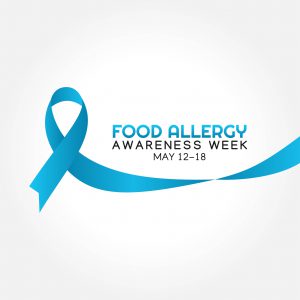 May 12- 18, 2024 has been designated as Food Allergy Awareness Week in an effort to raise awareness of food allergies and anaphylaxis.
May 12- 18, 2024 has been designated as Food Allergy Awareness Week in an effort to raise awareness of food allergies and anaphylaxis.
According to Food Allergy Research & Education (FARE), over 33 million Americans have a serious and potentially life-threatening food allergy. This number indicates that food allergies are much more common than previously believed.
An allergic reaction occurs when the body’s immune system mistakenly identifies a food component as a hazardous substance and attacks it. The effects of food allergies may appear on the skin, in the respiratory passage, or the gastrointestinal tract. The symptoms of food allergies may vary from mild to severe, and in extreme cases, they can even be fatal.
Anaphylaxis is a very serious allergic reaction that can cause death. This type of allergic reaction requires immediate action and medical attention. You must be prepared for an emergency if you or a loved one has a severe food allergy. Learn the signs and symptoms of anaphylaxis, which can include difficulty breathing, tongue swelling, low blood pressure., dizziness, or fast heart rate. You should create an emergency care plan in the event anaphylaxis occurs; this may include the administration of epinephrine, a life-saving drug, and calling 911 if symptoms persist.
Every year in the United States, approximately 30,000 individuals are brought to hospital emergency departments due to severe allergic reactions. Jamaica Hospital joins the effort to raise awareness about food allergies and urges everyone to learn more about this growing, yet manageable issue.
All content of this newsletter is intended for general information purposes only and is not intended or implied to be a substitute for professional medical advice, diagnosis or treatment. Please consult a medical professional before adopting any of the suggestions on this page. You must never disregard professional medical advice or delay seeking medical treatment based upon any content of this newsletter. PROMPTLY CONSULT YOUR PHYSICIAN OR CALL 911 IF YOU BELIEVE YOU HAVE A MEDICAL EMERGENCY.
